|
|
|
Sort Order |
|
|
|
Items / Page
|
|
|
|
|
|
|
| Srl | Item |
| 1 |
ID:
140267


|
|
|
|
|
| Summary/Abstract |
This article examines the role of the Islamic State of Iraq and Syria's (ISIS's) beheading videos in the United Kingdom and the United States. These videos are highly illustrative demonstrations of the importance of visual imagery and visual media in contemporary warfare. By functioning as evidence in a political discourse constituting ISIS as an imminent, exceptional threat to the West, the videos have played an important role in the re-framing of the conflict in Iraq and Syria from a humanitarian crisis requiring a humanitarian response to a national security issue requiring a military response and intensified counterterrorism efforts. However, this article seeks to problematize the role and status of ISIS's beheadings in American and British security discourses by highlighting the depoliticizing aspects of reducing a complicated conflict to a fragmented visual icon. The article concludes by emphasizing the need for further attention to how the visibility of war, and the constitution of boundaries between which acts of violence are rendered visible and which are not, shape the political terrain in which decisions about war and peace are produced and legitimized.
|
|
|
|
|
|
|
|
|
|
|
|
|
|
|
|
| 2 |
ID:
137944
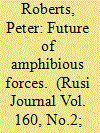

|
|
|
|
|
| Summary/Abstract |
In an era of international relations that is increasingly characterised by complexity and uncertainty, as well as a growing domestic reluctance to become ‘entangled’ abroad, the military options for political leaders in dealing with emerging crises appear to be dwindling. However, in this article Peter Roberts avers that there is one element of the British armed forces – its amphibious capability – that is relatively under-used as currently configured. If transformed into smaller, more frequently forward-deployed and capable units, amphibious forces could offer politicians an alternative option in crisis situations, and especially in those that emerge in the complex environment of the littoral.
|
|
|
|
|
|
|
|
|
|
|
|
|
|
|
|
| 3 |
ID:
147535
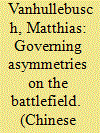

|
|
|
|
|
| Summary/Abstract |
Governing contemporary warfare is deeply rooted in the shift since the end of the Cold War towards humanitarianism, whose practice has been accompanied by the parallel evolution of international laws that regulate the use of force (jus ad bellum), the conduct of hostilities (jus in bello), and post-conflict justice (jus post bellum). Yet, new unequal obligations on behalf of the territorial state faced with proxy warfare internally and foreign intervention externally have challenged the core role of such governance, and led to further erosion of the normativity of those rules in the theatres of conflict. As a result, this rule-based approach to government falls short of restoring the actual relationships and human ties between the warring parties. The undesired outcome of such humanitarian ambitions can be mediated through relational governance, as espoused by Yaqing Qin, one of China’s leading international relations scholars, which is founded in a Chinese epistemological and relation-focused framework. Its tools and methods stress the importance of trust and harmonization of relationships, in order for the international laws governing warfare to regain their normativity based on such relationality; without a fertile soil, evolving norms may not gain root and compliance with those norms cannot be fostered in the first place.
|
|
|
|
|
|
|
|
|
|
|
|
|
|
|
|
| 4 |
ID:
138703
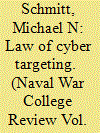

|
|
|
|
|
| Summary/Abstract |
The 2008 war between Georgia and Russia was predictably short, as Russian military might quickly trumped Georgian nationalist enthusiasm. Beyond its momentous geopolitical implications, it was the first war in which cyber activities loomed large; the conflict marked the public birth of “cyber war,” or at least cyber in war.
|
|
|
|
|
|
|
|
|
|
|
|
|
|
|
|
| 5 |
ID:
166605
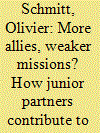

|
|
|
|
|
| Summary/Abstract |
There is a growing consensus that multinational military operations are often less effective than the theoretical sum of their constitutive parts. Multiple chains of command, restriction on intelligence sharing, and capability aggregation problems can reduce fighting power. However, partners may be necessary to provide legitimacy to an intervention. As such, most studies assume that the state leading a coalition (usually the United States) has to accept a degree of operational ineffectiveness in order to gain political benefits from the participation of junior partners to a multinational military operation. However, such analysis puts all junior partners under the same category, without taking into account the differentiated contributions of those junior partners based on their relative military power and international status. This article explores variation between the junior partners’ contributions and their impact on coalition political and military dynamics. It teases out the implications of adopting a fine-grained analysis of junior partners.
|
|
|
|
|
|
|
|
|
|
|
|
|
|
|
|
| 6 |
ID:
138580
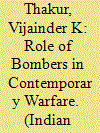

|
|
|
|
|
| Summary/Abstract |
No more are bombers used for strategic boming aimed at crippling an adversary's war fighting capability, as was the case in World War II.
|
|
|
|
|
|
|
|
|
|
|
|
|
|
|
|
| 7 |
ID:
133133
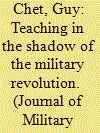

|
|
|
|
|
| Publication |
2014.
|
| Summary/Abstract |
In recent years, policy makers have noted that western armies in foreign lands l find themselves tasked with a new form of warfare. 'we'he novelty of twenty-f1rst Century warfare is usually traced to armies' non-combat tasks, such as civil and military engineering, economic development and security, crowd control, policing, community engagement, and public relations. Yet scholars of early modern are widely recognized these elements as central to the wars they examine, d thus not novel at all. Since specialists in the field examine armies engaged I dominantly in such non-combat activities, it is worth asking why similarities cen early modern and contemporary warfare are routinely overlooked. One _n is that despite rese-archers' increasing focus on the more mundane aspects strategy history, undergraduate classes retain the more traditional military history of battles and "Great Captains." In sections dealing with early modem ,for example, students get diplomacy, logistics, engineering, economics, social propaganda, and social control only in small doses, signifying to them that were less prevalent and less signi?cant than major battles in determining curse of wars and military affairs.
|
|
|
|
|
|
|
|
|
|
|
|
|
|
|
|
| 8 |
ID:
125073
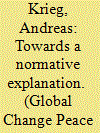

|
|
|
|
|
| Publication |
2013.
|
| Summary/Abstract |
The heavy direct or indirect reliance of liberal states on the military and security services of the private contractor in contemporary warfare is an undeniable reality. While the literature presents a wide array of different empirical explanations of why liberal states have come to increasingly rely on contractor support, this paper attempts to give a normative explanation to this development. This paper does not aim to refute the existing explanations but merely complement the most commonly stated reasons for outsourcing. It argues that the liberal state's hiring of private contractors can be understood against the backdrop of a wider trend whereby liberal states, increasingly operating in non-trinitarian operations, attempt to replace the soldier as a trinitarian servant with non-trinitarian means of warfare. This correlation between liberal state commitments in non-trinitarian warfare and a growing employment of non-trinitarian means of warfare can be explained by Social Contract theory and lays the foundation for a normative understanding of why liberal states resort to non-trinitarian contractor support amid non-trinitarian crises.
|
|
|
|
|
|
|
|
|
|
|
|
|
|
|
|
|
|
|
|
|